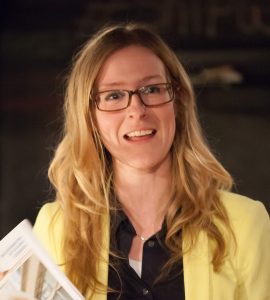Customised Schools: Laura McInerney
by Loic Menzies
29th September 2019
Laura McInerney is the Guardian’s education columnist and co-founder of the daily survey tool, Teacher Tapp. Formerly a teacher for six years in East London, she was the Centre for Education and Youth’s first ever regular blogger before being taken to court by the education secretary for asking difficult questions about free schools. This only encouraged her, and so she switched into journalism full-time and went on to become the editor of Schools Week.

My child-raising friends’ jaws hit the floor when they are told they will not get any meaningful choice when it comes to their child’s school. In a world where our shopping can arrive in less than 2 hours; where apps teach us Swahili, or coding, or maths; where someone will pick up our laundry and deliver it back home; or we can have personalised workouts barked at us via in-home speakers, the lack of choice when it comes to school can seem incongruous. Parents, they can only provide a preference and then they are told they must deliver their offsprungs to school at 9am and pick them up at 3.30pm. No customisation. No upgrade package. No drop-at-home service. For them, this is an outrage.
“No customisation. No upgrade package. No drop-at-home service. For them, this is an outrage.” @miss_mcinerney #DecadeInMaking Share on XWhile our customer service expectations are changing, so, too, are labour markets. Weekend work, evening shifts, working from home: all are now far more common. Flexible work means ‘always work’ for many. If you work for a company with offices in Shanghai or California there is no reason, beyond social decency and a desire for family time, that you can not take a conference call at either end of the day. (And who is concerned about such things when a wage, and thereby a mortgage, is on the line?)
Both shifts are likely to have a profound effect on schools over the next decade. First, if parents expect to speak to Amazon at all hours of the day, why would they not expect to communicate with their child’s teacher whenever they want? After all, they leave messages for colleagues in other countries or who work evenings – why not for Mrs Smith from Year 2?
Secondly, as parents are forced into work patterns that differ to their children’s, there is a gap in the market for private providers to take advantage. A low-cost school offering its school hours across four days a week, thereby allowing parents to take their children away for long weekends, would sweep up among the management classes who regularly work away from home four days-a-week, but are freed on Fridays. A state school running classes from Wednesday to Sunday might clean up in areas where tourist trade demands many parents work weekends.
“There is a gap in the market for private providers” @miss_mcinerney #DecadeInMaking Share on XA school that combines online learning with in-school learning, in a way that enables children to take holidays flexibly, and provides parents with clear real-time data on their child’s learning, is likely to take the ultimate prize.
How quickly can this happen? What format will it take? And will the state fund it or will it be a gradual drip-feed from the private sector? I do not know. But the likelihood that we get to 2030 without a shift in at least a part of our schooling sector seems deeply unlikely. If an additional seven per cent of parents moved into the private sector, that would mean the sector’s numbers had doubled. It would cause a serious problem for state schools. We should not underestimate the possibility this could happen.
Over the next ten years, there is a good chance the status quo will at least begin to break down. And when change comes, it may come quickly.
Over the next ten years, there is a good chance the status quo will at least begin to break down. @miss_mcinerney #DecadeInMaking Share on X

There’s a striking lack of moral judgement here. Would this reconfiguring of the lives of children and schools around parents’ current working habits be a good thing, or not? Is treating children’s education as a customisable product designed to be attractive to parent/consumers, right? What might the consequences of this be, and are they educationally and socially desirable?
I simply cannot understand why this article doesn’t address these questions. That it does not is frankly disturbing.